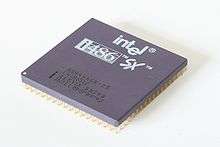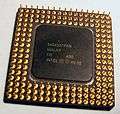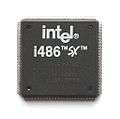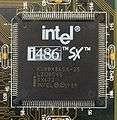Intel 80486SX
Intel's i486SX was a modified Intel 486DX microprocessor with its floating-point unit (FPU) disabled. It was intended as a lower-cost CPU for use in low-end systems. Computer manufacturers that used these processors include Packard Bell, Compaq, ZEOS and IBM.

Overview
In the early 1990s, common applications did not need or benefit from an FPU. Among the rare exceptions were CAD applications, which could often simulate floating point operations in software, but benefited from a hardware floating point unit immensely. AMD had begun manufacturing its 386DX clone which was faster than Intel's. To respond to this new situation Intel wanted to provide a lower cost i486 CPU for system integrators, but without sacrificing the better profit margins of a "full" i486. This was accomplished through a debug feature called Disable Floating Point (DFP), by grounding a certain bond wire in the CPU package. The i486SX was introduced in mid-1991 at 20 MHz in a PGA package. Later (1992) versions of the i486SX had the FPU entirely removed for cost-cutting reasons and comes in surface-mount packages as well.[1]
Many systems allowed the user to upgrade the i486SX to a CPU with the FPU enabled. The upgrade was shipped as the i487, which was a full-blown i486DX chip with an extra pin. The extra pin prevents the chip from being installed incorrectly. The NC# pin, one of the standard 168 pins, was used to shut off the i486SX.[1] Although i486SX devices were not used at all when the i487 was installed, they were hard to remove because the i486SX was typically installed in non-ZIF sockets or in a plastic package that was surface mounted on the motherboard. Later OverDrive processors also plugged into the socket and offered performance enhancements as well.
Gallery
 Pin side of an Intel i486 SX
Pin side of an Intel i486 SX Embedded i486SX (SQFP version).
Embedded i486SX (SQFP version). BQFP version.
BQFP version.
References
- Necasek, Michal (December 26, 2015). "Lies, Damn Lies, and Wikipedia OS/2 Museum". OS/2 Museum. Retrieved December 27, 2015.
This article is based on material taken from the Free On-line Dictionary of Computing prior to 1 November 2008 and incorporated under the "relicensing" terms of the GFDL, version 1.3 or later.
External links
Intel Datasheets